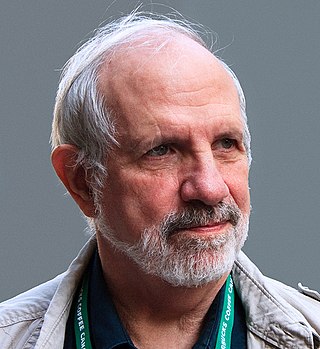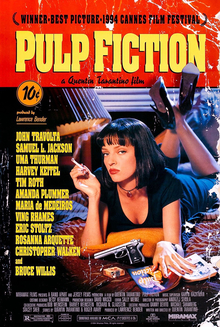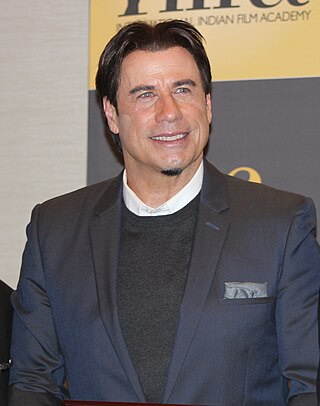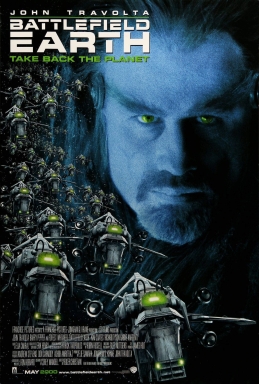
Brian Russell De Palma is an American film director and screenwriter. With a career spanning over 50 years, he is best known for work in the suspense, crime and psychological thriller genres. His films include mainstream box office hits such as Carrie (1976), Dressed to Kill (1980), Scarface (1983), The Untouchables (1987), and Mission: Impossible (1996), as well as cult favorites such as Sisters (1972), Phantom of the Paradise (1974), Blow Out (1981), Body Double (1984), Casualties of War (1989), and Carlito's Way (1993).

Quentin Jerome Tarantino is an American film director, screenwriter, and actor. His films are characterized by stylized violence, extended dialogue including a pervasive use of profanity, and references to popular culture.

Pulp Fiction is a 1994 American independent crime film written and directed by Quentin Tarantino from a story he conceived with Roger Avary. It tells four intertwining tales of crime and violence in Los Angeles, California. The film stars John Travolta, Samuel L. Jackson, Bruce Willis, Tim Roth, Ving Rhames, and Uma Thurman. The title refers to the pulp magazines and hardboiled crime novels popular during the mid-20th century, known for their graphic violence and punchy dialogue.

John Joseph Travolta is an American actor. Travolta began acting in television before transitioning into a leading man in films. His accolades include a Primetime Emmy Award and a Golden Globe Award, in addition to nominations for two Academy Awards and a BAFTA Award.
The decade of the 1980s in Western cinema saw the return of studio-driven pictures, coming from the filmmaker-driven New Hollywood era of the 1970s. The period was when the "high concept" picture was created by producer Don Simpson, where films were expected to be easily marketable and understandable. Therefore, they had short cinematic plots that could be summarized in one or two sentences. Since its implementation, this method has become the most popular formula for modern Hollywood blockbusters. At the same time in Eastern cinema, the Hong Kong film industry entered a boom period that significantly elevated its prominence in the international market.

Roger Roberts Avary is a Canadian-American film, television director, screenwriter and producer. He worked with Quentin Tarantino on Pulp Fiction, for which they won Best Original Screenplay at the 67th Academy Awards. Avary directed Killing Zoe, The Rules of Attraction, Lucky Day, and wrote the screenplays for Silent Hill and Beowulf.

Michael Madsen is an American actor. Alongside his frequent collaborations with Quentin Tarantino—Reservoir Dogs (1992), Kill Bill: Volume 2 (2004), The Hateful Eight (2015), and Once Upon a Time in Hollywood (2019)—he is known for his appearances in films such as The Natural (1984), The Doors (1991), Thelma & Louise (1991), Free Willy (1993), Species (1995), Donnie Brasco (1997), Die Another Day (2002), Sin City (2005), and Scary Movie 4 (2006). He has played voice roles in various video games, including Grand Theft Auto III (2001), Narc (2005), the Dishonored series (2012–2017), and Crime Boss: Rockay City (2023). Madsen has five children, including actor Christian Madsen.

Little Nicky is a 2000 American action comedy film directed by Steven Brill, written by Tim Herlihy, Adam Sandler, and Brill, and starring Sandler in the title role, Patricia Arquette, Harvey Keitel, Tommy "Tiny" Lister Jr., Rhys Ifans, and Rodney Dangerfield with supporting roles by Allen Covert, Kevin Nealon, Jon Lovitz, Michael McKean, and Quentin Tarantino.

My Best Friend's Birthday is a 1987 amateur comedy film directed, edited, co-written, co-produced by and starring Quentin Tarantino. The film was shot in black-and-white and was originally meant to have a runtime of seventy minutes, but only 36 minutes of the film are edited altogether, leaving the project unfinished.

The history of science fiction films parallels that of the motion picture industry as a whole, although it took several decades before the genre was taken seriously. Since the 1960s, major science fiction films have succeeded in pulling in large audience shares, and films of this genre have become a regular staple of the film industry. Science fiction films have led the way in special effects technology, and have also been used as a vehicle for social commentary.

Phil Tippett is an American film director and visual effects supervisor and producer, who specializes in creature design, stop-motion and computerized character animation. Over his career, he has assisted ILM and DreamWorks, and in 1984 formed his own company, Tippett Studio.

The Sender is a 1982 British psychological horror thriller film directed by Roger Christian and written by Thomas Baum. It stars Kathryn Harrold, Željko Ivanek, Shirley Knight, and Paul Freeman.

Lucky Numbers is a 2000 black comedy film directed by Nora Ephron. It stars John Travolta, Lisa Kudrow, Tim Roth, Ed O'Neill, Michael Rapaport, Richard Schiff, Daryl Mitchell, Bill Pullman, and Michael Moore in a rare acting role.

Visit to a Small Planet is a 1960 American black-and-white science fiction comedy film directed by Norman Taurog and starring Jerry Lewis, Joan Blackman, Earl Holliman, and Fred Clark. Distributed by Paramount Pictures, it was produced by Hal B. Wallis.

Battlefield Earth is a 2000 American science fiction film based on the 1982 novel of the same name by Scientology founder L. Ron Hubbard. It was directed by Roger Christian and stars John Travolta, Barry Pepper, and Forest Whitaker. The film follows a rebellion against the alien Psychlos, who have ruled Earth for 1,000 years.

Battlefield Earth: A Saga of the Year 3000 is a 1982 science fiction novel written by L. Ron Hubbard, founder of Scientology. He also composed a soundtrack to the book called Space Jazz.

Death Proof is a 2007 American action slasher film written and directed by Quentin Tarantino. It stars Kurt Russell as a stuntman who murders young women with modified cars he purports to be "death-proof". Rosario Dawson, Vanessa Ferlito, Jordan Ladd, Rose McGowan, Sydney Tamiia Poitier, Tracie Thoms, Mary Elizabeth Winstead, and Zoë Bell co-star as the women he targets.

Norman Reynolds was a British production designer and art director, best known for his work on the original Star Wars trilogy and Raiders of the Lost Ark.

Quentin Tarantino is an American filmmaker who has directed ten films. He first began his career in the 1980s by directing and writing Love Birds In Bondage and writing, directing and starring in the black-and-white My Best Friend's Birthday, a partially lost amateur short film which was never officially released. He impersonated musician Elvis Presley in a small role in the sitcom The Golden Girls (1988), and briefly appeared in Eddie Presley (1992). As an independent filmmaker, he directed, wrote, and appeared in the violent crime thriller Reservoir Dogs (1992), which tells the story of six strangers brought together for a jewelry heist. Proving to be Tarantino's breakthrough film, it was named the greatest independent film of all time by Empire. Tarantino's screenplay for Tony Scott's True Romance (1993) was nominated for a Saturn Award. Also in 1993, he served as an executive producer for Killing Zoe and wrote two other films.

The following is a list of unproduced Quentin Tarantino projects in roughly chronological order. During his career, American film director Quentin Tarantino has worked on a number of projects which never progressed beyond the pre-production stage under his direction. Some of these projects were officially cancelled and scrapped or fell in development hell.

















